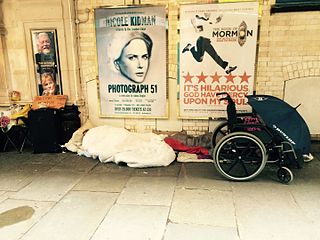Adjudication is the legal process by which an arbiter or judge reviews evidence and argumentation, including legal reasoning set forth by opposing parties or litigants, to come to a decision which determines rights and obligations between the parties involved.

Kay v Lambeth London Borough Council; Price and others and others v Leeds City Council [2006] were two, conjoined appeals in the final court of appeal relevant for English property law, UK human rights and English tort law (trespass). It involved claims for possession by two landlords against former short-term occupiers, heavily placing reliance in their defence on article 8 of the European Convention on Human Rights, with circumstances outwith the other laws.

In England, local authorities have duties to homeless people under Part VII of the Housing Act 1996 as amended by the Homelessness Act 2002. There are five hurdles which a homeless person must overcome in order to qualify as statutory homeless. If an applicant only meets the first three of these tests Councils still have a duty to provide interim accommodation. However an applicant must satisfy all five for a Council to have to give an applicant "reasonable preference" on the social housing register. Even if a person passes these five tests councils have the ability to use the private rented sector to end their duty to a homeless person.
Thoburn v Sunderland City Council is a UK constitutional and administrative law case, concerning the interaction of EU law and an Act of Parliament. It is important for its recognition of the supremacy of EU law and the basis for that recognition. Though the earlier Factortame had also referred to Parliament's voluntary acceptance of the supremacy of EU law, Thoburn put less stress on the jurisprudence of the ECJ and more on the domestic acceptance of such supremacy; Lord Justice Laws suggested there was a hierarchy of "constitutional statutes" that Parliament could only expressly repeal, and so were immune from implied repeal.
Judicial review is a part of UK constitutional law that enables people to challenge the exercise of power, usually by a public body. A person who contends that an exercise of power is unlawful may apply to the Administrative Court for a decision. If the court finds the decision unlawful it may have it set aside (quashed) and possibly award damages. A court may impose an injunction upon the public body.

Homelessness in the United Kingdom is measured and responded to in differing ways in England, Scotland, Wales and Northern Ireland but affects people living in every part of the UK's constituent countries.

United Kingdom administrative law is part of UK constitutional law that is designed through judicial review to hold executive power and public bodies accountable under the law. A person can apply to the High Court to challenge a public body's decision if they have a "sufficient interest", within three months of the grounds of the cause of action becoming known. By contrast, claims against public bodies in tort or contract are usually limited by the Limitation Act 1980 to a period of 6 years.

Anti-homelessness legislation can take two forms: legislation that aims to help and re-house homeless people; and legislation that is intended to send homeless people to homeless shelters compulsorily, or to criminalize homelessness and begging.

Administrative law in Singapore is a branch of public law that is concerned with the control of governmental powers as exercised through its various administrative agencies. Administrative law requires administrators – ministers, civil servants and public authorities – to act fairly, reasonably and in accordance with the law. Singapore administrative law is largely based on English administrative law, which the nation inherited at independence in 1965.

Illegality is one of the three broad headings of judicial review of administrative action in Singapore, the others being irrationality and procedural impropriety. To avoid acting illegally, an administrative body or public authority must correctly understand the law regulating its power to act and to make decisions, and give effect to it.

Gisda Cyf v Barratt [2010] UKSC 41 is a UK labour law case, concerning unfair dismissal governed by the Employment Rights Act 1996.

R v Horncastle & Others[2009] UKSC 14 was a decision of the Supreme Court of the United Kingdom regarding hearsay evidence and the compatibility of UK hearsay law with the right to a fair trial under Article 6 of the European Convention on Human Rights (ECHR). The case represents another stage in the judicial dialogue between the European Court of Human Rights (ECtHR) and the higher courts of the United Kingdom about whether it is acceptable to base convictions "solely or to a decisive extent" on evidence made by a witness who is identified but does not appear in court.

Government of the Republic of South Africa and Others v Grootboom and Others is an important case in South African law, heard in the Constitutional Court on 11 May 2000, with judgment handed down on 4 October.
The failure of a public authority to take into account relevant considerations and the taking of irrelevant ones into account are grounds of judicial review in Singapore administrative law. They are regarded as forms of illegality.
Gatekeeping is a term in British housing law which describes when a Council refuses to accept a homelessness application and/or provide accommodation when they have a legal duty to do so. Pressure for Councils to engage in "gatekeeping" can be the result of the high cost of providing temporary accommodation or there simply not being enough housing within a borough to accommodate homeless applicants. Gatekeeping practices of some local authorities have been challenged by judicial review.

Uber BV v Aslam [2021] UKSC 5 is a landmark case in UK labour law and company law on employment rights. The UK Supreme Court held the transport corporation, Uber, must pay its drivers the national living wage, and at least 28 days paid holidays, from the time that drivers log onto the Uber app, and are willing and able to work. The Supreme Court decision was unanimous, and upheld the Court of Appeal, Employment Appeal Tribunal, and Employment Tribunal. The Supreme Court, and all courts below, left open whether the drivers are also employees but indicated that the criteria for employment status was fulfilled, given Uber's control over drivers.

Hill v Chief Constable of West Yorkshire[1987] UKHL 12, [1989] AC 53 was a judicial decision of the House of Lords in relation to the claim by the mother of Jacqueline Hill against West Yorkshire Police that their negligence in failing to apprehend the killer resulted in her daughter's death.

R. v. Secretary of State for the Home Department was a case decided on 3 November 2005 by the UK House of Lords that determined whether or not a delay in initiating an application to seek asylum limited an individual from receiving access to state relief. Furthermore, the case questioned whether this denial of state relief constituted a breach of the European Convention on Human Rights 1950 ('ECHR').

Robinson v Chief Constable of West Yorkshire Police[2018] UKSC 4 is a leading English tort law case on the test for finding a duty of care. An elderly woman was injured by two police officers attempting to arrest a suspect and she claimed that the police owed her a duty of care not to be put in danger. The UK Supreme Court found that the police did owe a duty of care in this case as there was no general rule that the police are not under any duty of care when performing their duties.











